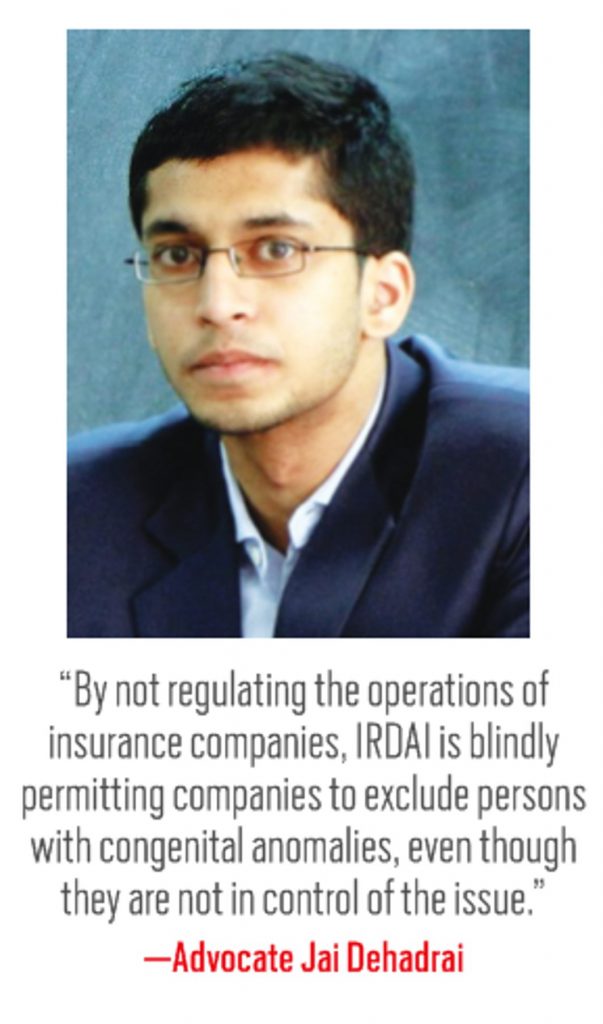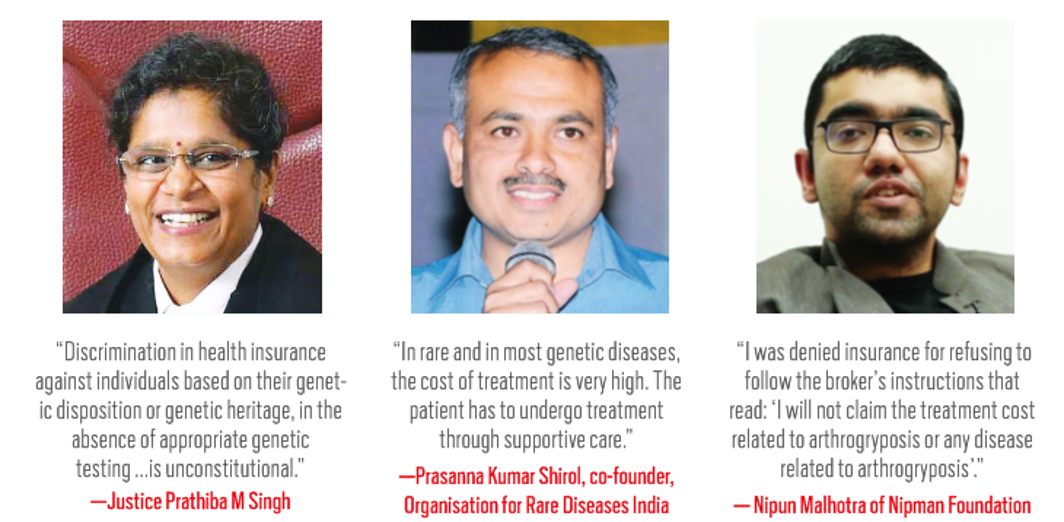Above: Most patients rely on insurance to meet the high cost of private medical treatment. Photo: adityahospital.co.in
In a move to help those suffering from genetic diseases, the Delhi High Court has ordered that insurance companies cannot have exclusionary clauses for these ailments in their policies
~By Usha Rani Das
A recent Delhi High Court judgment has sparked a new debate about health insurance policies and genetic diseases. The Court has said that discrimination based on genetic heritage is unconstitutional and a violation of Article 14 of the Constitution—the Right to Equality.
The judgment, passed by Justice Prathiba M Singh, in United India Insurance Company Limited vs Jai Parkash Tayal, stated: “Discrimination in health insurance against individuals based on their genetic disposition or genetic heritage, in the absence of appropriate genetic testing and laying down of intelligible differentia, is unconstitutional.” It adds that the clause used by insurance companies to exclude those with genetic disorders is “too broad, ambiguous and discriminatory—hence violative of Art. 14 of the Constitution of India”.
It said that common diseases like diabetes and cardiac diseases could be included in the broad definition and hence, it makes the exclusion “vulnerable”. “In effect, it would mean that large swathes of population would be excluded from availing health insurance which could have a negative impact on the health of a country,” Justice Singh stated.
The Court, however, added that pure genetic disorders such as Huntington’s Disease, Down’s Syndrome, and so on, can be treated differently in insurance policies. “However, exclusion of the en-tire gamut of disorders which are speculatively genetic would be totally illegal.”
 Three weeks after the Court had asked the Insurance Regulatory and Development Authority of India (IRDAI) to create a proper framework in this regard, the regulatory authority sent a notice to all companies to not exclude genetic diseases. It stated: “In pursuance to the directions of Hon’ble High Court all insurance companies offering contracts of Health Insurance are hereby directed that no claim in respect of any existing health insurance policy shall be rejected based on exclusions related to ‘Genetic Disorder’. All insurance companies are directed not to include ‘Genetic Disorders’ as one of the exclusions in new health insurance policies issued in respect of all their existing health insurance products and also in the new products launched and/or filed under the provisions of Guidelines on Product Filing in Health Insurance Business.” But it failed to provide any specific guideline. Hence, insurance companies are still clueless and rejecting claims based on genetic heritage.
Three weeks after the Court had asked the Insurance Regulatory and Development Authority of India (IRDAI) to create a proper framework in this regard, the regulatory authority sent a notice to all companies to not exclude genetic diseases. It stated: “In pursuance to the directions of Hon’ble High Court all insurance companies offering contracts of Health Insurance are hereby directed that no claim in respect of any existing health insurance policy shall be rejected based on exclusions related to ‘Genetic Disorder’. All insurance companies are directed not to include ‘Genetic Disorders’ as one of the exclusions in new health insurance policies issued in respect of all their existing health insurance products and also in the new products launched and/or filed under the provisions of Guidelines on Product Filing in Health Insurance Business.” But it failed to provide any specific guideline. Hence, insurance companies are still clueless and rejecting claims based on genetic heritage.
In the case before the Delhi High Court, the petitioner, Jai Parkash Tayal, had taken an insurance policy for himself, his wife and daughter from United India Insurance Company Limited amounting to `5 lakh per person. He was diagnosed with a genetic disease—HOCM (Familial hypertrophic cardiomyopathy). He was hospitalised in 2004 and 2006 for complications arising out of HOCM and claims for the treatment were duly honoured. However, in 2011, he was hospitalised again at Fortis Escorts Heart Institute in Delhi and filed a claim of Rs 7,78,864, but this was rejected. The reason given by the insurance company was: “…We are closing your claim file, on account of the following reasons:- ‘TPA Vipun Medcorp P Ltd had repudiated your claim. Since genetic diseases are not payable as per the policy, genetic exclusion clauses….’” Tayal states that this exclusion was not present in the initial policy document, and was a later addition, which was not in his knowledge.
Advocate Jai Dehadrai of Dehadrai and Co. told India Legal: “The fact that the plaintiff had got the insurance claim on two previous occasions clearly indicated that the latest rejection merely amounted to discriminating against the plaintiff who suffered from genetic disorders.”
Tayal is not the only victim of insurance companies. The daughter of Prasanna Kumar Shirol was denied health insurance as she had Pompe disease. Shirol, the co-founder and executive director of Organisation for Rare Diseases India, told India Legal that though he had health insurance initially, he stopped paying the premium when her claims were rejected. He said: “The court’s decision was long due. I think somebody has paved the way.” He explained the challenges a person with a genetic or rare disease faces. “First of all, when enrolling for insurance, the person may not know that he or his child is suffering from a genetic or a rare disease because the average diagnosis period for such diseases is seven years. Eighty percent of genetic diseases are chronic and progressive in nature, which means they show over a period of time. The second problem is when the previous child or family already has a history of genetic diseases. Now how are we going to inform the insurance company? In every pregnancy, there is a 25-50 percent chance of getting it but it is not that every member is likely to get affected,” he explained.
Shirol also pointed out that in rare diseases and in most genetic diseases, the cost of treatment is very high. The patient has to undergo treatment through supportive care. “For some diseases, it runs into crores. Most of my daughter’s treatment is based on her weight. Suppose my child is 10 kg, her treatment cost is Rs 30-40 lakh a year. So when she becomes 30 kg, it becomes Rs 1.2 crore and so on. There is no inclusive provision in insurance policies for supportive care treatment.”
Nipun Malhotra, who suffers from arthrogryposis, was also denied health insurance as he had a genetic condition. Malhotra, CEO of Nipman Foundation which caters to people with disabilities, said that the reasons given by insurance companies are proof of their complete apathy towards people with disabilities. He told India Legal: “I was denied insurance by a public sector firm for refusing to follow the broker’s instructions that read: ‘I will not claim the treatment cost related to arthrogryposis or any disease related to arthrogryposis’. Another insurance company made me undergo a ‘medical test’.”
He added that though some do give an insurance policy, they later reject claims arbitrarily. “Does each person have to go to court? Most companies do not even give insurance. Some give it but reject it later, citing various reasons.”
An official in one of the largest private insurance companies told India Legal on condition of anonymity: “Disabilities are not covered because the companies don’t want to take the responsibility. Insurance policies have become a business deal. They look for customers from whom they think they can earn a huge profit.”
Besides genetic diseases, insurance companies have also been discriminating against other disabilities—genetic or environmental. Abhishek Dixit (name changed), a Mumbai-based hedge fund manager, suffered a spinal cord injury in 2011 that left him paralysed. He said: “I applied for an insurance policy from Max India this year. I told them my health history. But on the phone itself, they told me there was no need to apply as I have a disability. After that, I wrote to the chief underwriter and I was told that they are not willing to give me any insurance. The same happened last year with ICICI. They categorically refused to even go through my application. I could have a minor or a major disability but they didn’t even bother to ask.”
In January 2018, he wrote to the commissioner of disabilities about how companies were discriminating against people with disabilities. “In February, the court of the commissioner of disabilities wrote to IRDAI with my mail attached and asked it to take action within a month and reply with regard to the action taken.”
Malhotra is also seeking to file a writ petition in the Delhi High Court where he is looking to challenge the exclusion of “congenital anomalies” from insurance policies. “IRDAI, by not regulating the operations of insurance companies, is blindly permitting insurance companies to exclude persons with congenital anomalies, even though they are not in control of the issue, nor voluntarily consented to suffer the harm,” said Dehadrai, who is also Malhotra’s lawyer.
Nikhil Bharadwaj, head of corporate communication at Bajaj Allianz General Insurance Company Limited, told India Legal that it was too early for the company to comment as it had not got any specific instructions from IRDAI. All major insurance companies—ICICI, HDFC Ergo, Max Bupa, Reliance General Insurance, Tata AIA Life Insurance, United India Insurance—refused to comment.
An insurance agent said: “A company’s board of directors cannot do anything with the court order. Action has to be taken by IRDAI.”
The Court’s judgment also criticised IRDAI for allowing discrimination. It stated: “The IRDAI had issued guidelines on standardisation in health insurance, dated 20 February 2013, which had a specific exclusion with respect to ‘pregnancy, infertility, congenital and genetic conditions’… Unfortunately, however, the term ‘genetic conditions’ is not defined in the guidelines. Thus… the IRDA itself permitted insurance companies to provide for exclusions based on genetic conditions. These guidelines have now been superseded by guidelines dated 29 July 2016, wherein only ‘congenital anomalies’ have been defined and genetic conditions do not find a mention. Thus, ‘genetic conditions’ can no longer be excluded.”
An official at Vipul Medcorp said the industry is waiting for IRDAI to take action.
Malhotra had written a letter to IRDAI earlier this month asking it to stop the discrimination and include congenital diseases but he did not get any response. Dixit said: “It is less of a regulatory body and more a body to promote the interests of health insurance companies.” Malhotra feels that insurance companies should be penalised whenever they discriminate on the basis of disabilities. While Shirol thinks a rare diseases policy needs to be in place before dealing with insurance issues, he said: “There is no data, no facilities available for rare and genetic diseases in India. How can one ask for insurance without being fully aware of it? I think the government can have a fund scheme whereby the patient pays some part of his premium which is equitable to his income and the rest is paid by the government.”
While the judgment has brought relief to millions, the road to its success seems arduous.



Comments are closed.